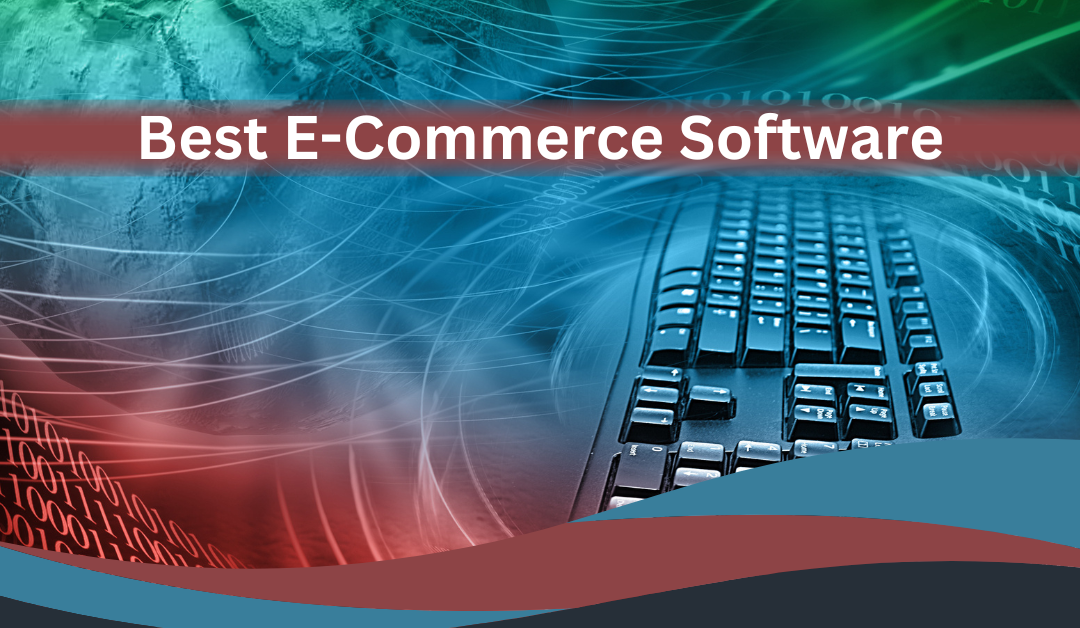E-commerce has witnessed incredible growth over time, offering businesses of all sizes powerful tools for selling online. Selecting an appropriate e-commerce software platform is essential to creating a positive shopping experience, managing inventory efficiently, and driving sales growth. Various platforms are available; choosing one that aligns with your business requirements while offering scalability, flexibility, and robust features is vital. Shopify, Magento, and WooCommerce stand out as top options, each providing advantages tailored to its model or technical knowledge levels.
Shopify
It is an industry-leading e-commerce platform known for its user-friendly drag-and-drop builder and comprehensive features for businesses of all sizes. Shopify is ideal for quickly setting up an online store without needing professional design skills while selling directly through social media such as Facebook and Instagram and marketplaces such as Amazon and eBay – providing companies with an efficient e-commerce presence online an efficient e-commerce presence.
Magento
Magento, an Adobe company, is widely respected for its flexibility and scalability, making it the go-to solution for large businesses and enterprises. Unlike Shopify’s open-source platform approach, Magento allows companies to tailor storefronts based on specific design elements or functional requirements – providing their customers with seamless shopping experiences worldwide.
WooCommerce
WooCommerce is an open-source e-commerce plugin designed specifically for WordPress, which is an excellent solution for businesses already using this platform. Integrated seamlessly, WooCommerce allows users to transform their websites into fully functioning online stores quickly and effortlessly through simple installation. Its many extensions/plugin extensions provide additional functionality, making WooCommerce suitable for startups and multinational conglomerates.
As previously discussed, selecting an effective e-commerce software platform is of immense significance for any business looking to thrive online. Shopify, Magento, and WooCommerce all offer distinct advantages tailored to specific business requirements and technical capabilities. Whether your priority lies in ease of use, customization, or scaling, these platforms provide solid solutions for building and expanding successful stores online.
List Of Top 10 E-commerce Software Solutions
In today’s digital environment, e-commerce software is integral in helping businesses establish and expand their online presence. From startups to established enterprises, selecting an e-commerce platform tailored to your business can dramatically affect success – offering features that streamline operations, enhance customer experiences, and accelerate sales growth. Here is our curated list of the 10 Best E-Commerce Software with short descriptions so that you can make an informed decision when selecting.
List here
1. Shopify: With its comprehensive approach to building and managing online stores, Shopify provides an all-in-one solution for launching an e-commerce business.
2. Magento: Magento offers robust e-commerce solutions explicitly tailored for large enterprises.
3. WooCommerce: WooCommerce integrates seamlessly with WordPress for flexible storefront options and online storefront functionality.
4. BigCommerce: BigCommerce provides businesses with an e-commerce platform designed to expand and scale rapidly.
5. Squarespace offers attractive design templates and robust e-commerce functionality, creating a powerful combination. 6. Wix is an accessible platform boasting numerous e-commerce features.
7. Volusion offers an all-in-one e-commerce solution with user-friendly management tools. 8.PrestaShop is an open-source e-commerce platform offering customization features.
9. OpenCart: OpenCart offers multiple storefronts and customization features
10. Shift4 Shop provides an integrated marketing platform with various integrated tools.
Furthermore:
The selection of efficient e-commerce software can make or break an online business. Shopify is distinguished by its comprehensive features and ease of use; Magento excels at offering scalable solutions for large enterprises to increase flexibility and control; BigCommerce was designed for rapid expansion with reliable hosting for high traffic volumes and transactions; WooCommerce integrates easily with WordPress installations while Squarespace’s eye-catching templates attract brands prioritizing aesthetic over functionality.
Wix offers small businesses user-friendly e-commerce features explicitly designed to meet their needs. At the same time, Volusion provides an all-in-one solution with powerful management tools for streamlining various aspects of an online store. Meanwhile, PrestaShop’s open-source platform enables extensive customization and adaptability; OpenCart supports multiple storefronts, enabling managing different brands under one umbrella, while 3dcart is equipped with built-in marketing tools designed to promote and expand a store effectively.
Each e-commerce platform offers unique benefits to meet businesses’ varying needs and sizes, providing an excellent foundation for growth in an increasingly digital marketplace. By understanding its features and benefits, companies can select an e-commerce software solution that best meets their goals and technical requirements, creating a solid basis for expansion within this competitive digital marketplace.
Reviews Of E-Commerce Software
E-commerce software plays an invaluable role in today’s digital marketplace, helping businesses efficiently manage online sales while improving customer experiences, driving growth, cutting expenses, and streamlining operations. It also offers tools for product management, processing payments, and handling customer interactions smoothly, keeping pace with rapidly shifting market needs through cutting-edge e-commerce solutions.
E-commerce software simplifies running an online store by saving both time and reducing errors in operations. Users can easily update product listings, manage inventories, track sales performance, and access integrated payment gateways securely – giving customers an optimal shopping experience and increasing satisfaction and loyalty while supporting various marketing strategies via SEO tools and analytics that offer insight into customer behavior and sales performance for informed decision making that helps businesses increase profits.
Furthermore:
At the core of our software solution lies its scalability, making rapid business expansion painless. Support for multiple languages and currencies facilitates global sales, while businesses can deliver tailored experiences across devices via tailored recommendations or promotions. Mobile responsiveness ensures seamless shopping across devices. Customer service can be enhanced through chatbots or help desks integrated within our software, and security features are often incorporated to protect customer data and transactions.
Regular updates ensure platforms remain secure and provide new features, while E-commerce software allows easy integration with other business tools and platforms, including social media channels that expand brand reach, engagement, and retention; inventory management tools help reduce overstock/stockout costs for optimal storage costs while offering customizable templates to create unique store designs.
Implementing e-commerce software enables businesses to increase operational efficiency and customer satisfaction while freeing time for more creative pursuits than tedious administrative duties. E-commerce software is essential for online success stories.
Shopify

Shopify has emerged as one of the leading e-commerce platforms for businesses of all sizes. Its user-friendly interface, extensive features, and robust support make it a preferred choice for many entrepreneurs. Whether you’re a small business owner or running a large enterprise, It offers a range of tools to help you build and grow your online store effectively.
User-Friendly Interface
Shopify provides a clean, intuitive interface that simplifies store management. Even beginners find it easy to navigate and set up, and the platform requires no advanced technical skills to operate efficiently.
Comprehensive App Ecosystem
It boasts a vast app store with numerous integrations. You can enhance your store with marketing, sales, and inventory apps. This ecosystem allows you to customize and expand your store’s functionality.
Excellent Customer Support
Shopify offers 24/7 customer support through chat, email, and phone. Their knowledgeable support team assists with technical issues and general queries. It ensures you have help whenever needed, keeping your store running smoothly.
Mobile-Responsive Themes
It provides a wide selection of mobile-responsive themes from which to choose. These themes ensure your store looks great on any device. A mobile-friendly design helps attract and retain more customers.
Secure and Reliable
Shopify takes care of hosting, security, and updates for you. The platform provides SSL certificates and PCI compliance to protect customer data. This reliability lets you focus on growing your business without worrying about technical issues.
With these advantages, It is an excellent choice for e-commerce businesses. Its ease of use, flexibility, and strong support help entrepreneurs succeed online. Whether you’re just starting or looking to scale, Shopify provides the tools and resources needed for success.
Pros
1. Shopify offers a user-friendly interface for easy store setup.
2. The platform provides a wide range of customizable themes and templates.
3. It supports integration with numerous third-party apps and services.
4. Shopify offers 24/7 customer support to assist merchants promptly.
Cons
1. Transaction fees apply when using external payment gateways.
2. Advanced features require additional app purchases, increasing costs.
3. Customization options might be limited for some merchants.
4. Shopify’s pricing plans can be expensive for small businesses.
Magento

Magento is a powerful e-commerce platform known for its flexibility and extensive features, making it a popular choice for online retailers. Its open-source nature allows businesses to customize their online stores to fit their needs, providing a tailored shopping experience. Magento’s robust functionality and scalability support businesses of all sizes, from small startups to large enterprises. Here are five key advantages of using Magento as your e-commerce software.
Customizable and Flexible Platform
Magento offers extensive customization options for online stores. Businesses can create unique, tailored shopping experiences for customers. The platform supports numerous extensions and themes to enhance functionality. It’s flexible, adapting to various business models and requirements. Customization extends to both front-end design and back-end processes. This flexibility ensures that the platform grows with your business needs.
Scalability for Growing Businesses
Magento efficiently handles increasing traffic and product catalogs. The platform scales seamlessly with business growth. It supports extensive inventories and high-traffic volumes without performance issues. Magento’s architecture ensures smooth operation during peak times. This scalability makes it ideal for both small and large enterprises. Businesses can expand without worrying about technical limitations.
Advanced SEO Features
Magento comes with built-in SEO tools to improve search engine rankings. It offers features like customizable URLs, meta tags, and sitemaps. These tools help attract organic traffic and improve visibility. Magento’s SEO capabilities ensure products appear in relevant search results. The platform integrates easily with third-party SEO plugins. Practical SEO tools make Magento an excellent choice for online marketing.
Extensive Integration Capabilities
Magento integrates with numerous third-party applications and services. It includes payment gateways, shipping providers, and marketing tools. Integration capabilities streamline operations and enhance functionality. The platform’s API allows for custom integrations and development. Businesses can connect Magento with CRM, ERP, and other systems. Extensive integration ensures a cohesive and efficient business operation.
Strong Community and Support
Magento has a large, active community of developers and users. This community provides valuable resources, extensions, and support. Businesses benefit from regular updates and security patches. Magento’s forums and documentation offer solutions to common issues. Access to expert developers and agencies is readily available. The strong community ensures continuous improvement and support for users.
In summary, Magento’s flexibility, scalability, SEO features, integration capabilities, and strong community support make it a top choice for e-commerce. Its comprehensive features empower businesses to create robust, personalized, and efficient online stores.
Pros
1. Magento offers extensive customization options for unique store designs.
2. It provides a wide range of built-in features for e-commerce.
3. Magento is scalable and suitable for businesses of all sizes.
4. The platform has a large community for support and resources.
Cons
1. Magento requires technical expertise for setup and maintenance.
2. It can be resource-intensive, requiring robust hosting infrastructure.
3. Customization can be complex and time-consuming for beginners.
4. Magento’s enterprise edition can be costly for small businesses.
WooCommerce
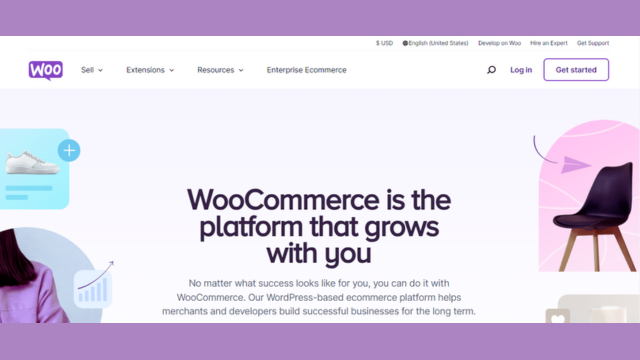
WooCommerce is a powerful and versatile e-commerce platform built for WordPress. Its flexibility and customization options make it popular among online store owners. With WooCommerce, users can leverage the robust features of WordPress to create a seamless shopping experience. The platform supports a wide range of products and offers extensive integration capabilities. WooCommerce is a leading e-commerce software due to its user-friendly interface and scalability. Let’s explore the advantages that make WooCommerce a top choice for e-commerce.
Easy Integration with WordPress
WooCommerce integrates seamlessly with WordPress, ensuring a smooth setup process. Existing WordPress users find the transition to WooCommerce effortless. The familiar interface makes managing an online store intuitive and straightforward. WordPress plugins and themes enhance WooCommerce’s functionality. This integration provides a cohesive experience for store owners and customers.
Extensive Customization Options
Customization is a crucial strength of WooCommerce, offering numerous design possibilities. Users can tailor their online store to match their brand’s identity. WooCommerce supports a wide array of themes and plugins. These tools allow for unique and personalized e-commerce solutions. Store owners can easily modify layouts, colors, and features.
Scalability for Growing Businesses
WooCommerce scales effectively to accommodate growing business needs. It effortlessly handles increased traffic and more extensive product catalogs. Businesses can start small and expand without switching platforms. WooCommerce’s flexibility ensures that stores can adapt to market demands. This scalability makes WooCommerce suitable for enterprises of all sizes.
Wide Range of Payment Options
WooCommerce supports various payment gateways, providing flexibility to customers. It integrates with popular payment methods like PayPal, Stripe, and more. This variety ensures that customers have their preferred payment options. Secure and reliable transactions enhance the shopping experience. WooCommerce’s diverse payment options cater to a global audience.
Strong Community Support
WooCommerce is ideal for an active community of users and developers. This community provides valuable resources, tutorials, and support forums. Store owners can find solutions to common issues quickly and easily. The community’s feedback provides regular updates and improvements. The strong support network ensures WooCommerce remains reliable and innovative.
WooCommerce’s integration with WordPress, customization options, scalability, payment flexibility, and community support make it a leading e-commerce solution. Store owners can confidently build and grow their online presence using WooCommerce. Its comprehensive features and user-friendly design cater to diverse business needs.
Pros:
1. Integrates seamlessly with WordPress for easy website creation.
2. Offers a wide range of free and paid extensions.
3. Provides flexibility in design and customization options.
4. Allows for unlimited products and transactions without additional fees.
Cons:
1. Requires WordPress knowledge for optimal setup and management.
2. Some advanced features may require paid extensions.
3. May experience performance issues with large-scale stores.
4. Limited customer support compared to hosted solutions.
BigCommerce

BigCommerce stands out as a leading e-commerce platform, offering robust solutions for online retailers. It caters to businesses of all sizes, providing tools that simplify store management and enhance customer experiences. Its comprehensive feature set makes it a top choice for entrepreneurs and enterprises.
Scalability and Flexibility
BigCommerce supports business growth with its scalable and flexible platform. It easily accommodates increasing traffic and sales volumes, so businesses can expand without worrying about outgrowing their platform. Its flexibility ensures it meets diverse business needs efficiently. BigCommerce adapts to changes without compromising performance or functionality.
User-Friendly Interface
BigCommerce features a user-friendly interface that simplifies store management. The platform’s intuitive design helps users navigate effortlessly. It reduces the learning curve, allowing businesses to focus on growth. Even users without technical expertise can manage their stores effectively. The interface promotes efficient and straightforward store operations.
Robust SEO Tools
BigCommerce includes robust SEO tools that enhance online visibility. These tools help businesses improve search engine rankings effectively. They offer customizable URLs, metadata, and other SEO elements. The platform supports better indexing, attracting more organic traffic. Enhanced SEO capabilities drive higher conversion rates and sales.
Comprehensive Integrations
BigCommerce offers comprehensive integrations with various third-party applications. These integrations significantly enhance the platform’s functionality. Businesses can connect with essential tools like payment gateways and CRMs. The integrations streamline operations and improve overall efficiency. BigCommerce ensures seamless connectivity with vital business applications.
Advanced Security Features
BigCommerce provides advanced security features to protect online stores. The platform ensures compliance with industry security standards. It includes SSL certification and multi-layered security measures. These features safeguard customer data and transactions effectively. Enhanced security builds customer trust and boosts sales.
BigCommerce’s impressive scalability, user-friendly interface, robust SEO tools, comprehensive integrations, and advanced security features make it a top e-commerce solution. Its capabilities empower businesses to grow and succeed in the competitive online market.
Pros
1. BigCommerce offers robust built-in features for online stores.
2. The platform provides scalable solutions suitable for growing businesses.
3. BigCommerce offers excellent SEO tools to improve search engine visibility.
4. It provides multiple payment gateway options for seamless transactions.
Cons
1. big commerce’s pricing plans may be expensive for small businesses.
2. Customization options are limited compared to some other platforms.
3. The platform can be complex to navigate for beginners.
4. Advanced features may require technical expertise for implementation.
Squarespace
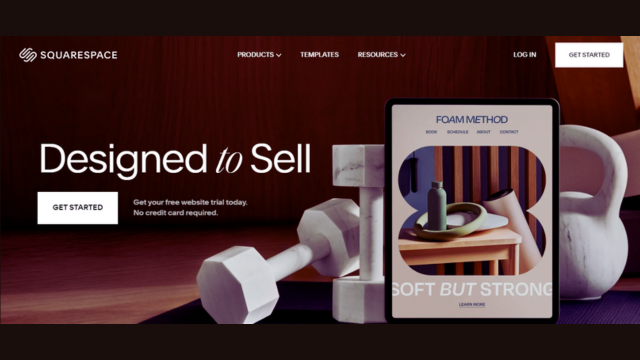
Squarespace has emerged as a leading e-commerce platform, offering a comprehensive solution for businesses of all sizes. Known for its sleek design capabilities, user-friendly interface, and robust functionality, Squarespace allows users to easily create visually appealing online stores. This platform provides various tools and features that enable businesses to manage their online presence effectively and efficiently. Here are five compelling reasons why Squarespace stands out as an excellent choice for e-commerce software.
Elegant and Customizable Design Templates
Squarespace offers elegant design templates that can be easily customized. Users can choose from a wide range of templates tailored to various industries. The intuitive design interface allows users to make adjustments without coding knowledge. This flexibility ensures each online store looks unique and professional.
Integrated E-commerce Tools
Squarespace comes equipped with integrated e-commerce tools that simplify online selling. Features include inventory management, product cataloging, and payment processing. These tools are built into the platform, providing a seamless experience for store management. Users can also track orders and manage customer relationships effectively.
Robust Security Features
Security is a top priority for any e-commerce platform. Squarespace provides robust security features to protect both the store and its customers. SSL certificates are included, ensuring secure transactions and data protection. Regular updates and maintenance keep the platform safe from potential threats.
SEO and Marketing Capabilities
Squarespace offers strong SEO and marketing capabilities to boost online visibility. Built-in SEO tools help optimize product listings for search engines. Marketing integrations like email campaigns and social media drive traffic to online stores. These features help businesses attract and retain customers effectively.
Excellent Customer Support
Squarespace provides excellent customer support to assist users with their needs. A dedicated support team is available 24/7 via live chat and email. Comprehensive guides and tutorials help users troubleshoot issues independently. This support ensures users can maintain their stores with minimal disruption.
In conclusion, Squarespace’s design flexibility, integrated tools, security features, marketing capabilities, and customer support make it an outstanding e-commerce platform. Using Squarespace, businesses can easily create and manage professional, secure, and successful online stores.
Pros
1. Squarespace offers stunning and customizable website templates for businesses.
2. It provides built-in tools for SEO optimization to improve visibility.
3. Squarespace integrates seamlessly with various payment processors for transactions.
4. The platform offers reliable customer support for assistance and guidance.
Cons
1. Squarespace lacks advanced e-commerce features compared to some competitors.
2. Limited third-party integrations may restrict customization options for users.
3. Transaction fees can be higher compared to other e-commerce platforms.
4. The inventory management system may need to be more robust for larger stores.
Wix

Wix is a popular e-commerce platform enabling businesses to easily create and manage online stores. Its user-friendly interface and extensive customization options make it a go-to choice for entrepreneurs and small businesses. With Wix, you can design a professional-looking online store without needing advanced technical skills. Let’s explore the key advantages of using Wix for your e-commerce needs.
Easy-to-Use Interface
Wix offers an intuitive drag-and-drop interface, simplifying website creation. Even beginners can effortlessly design and customize their online store. No coding knowledge is required, making it accessible to all.
Extensive Template Collection
Wix provides a wide array of professionally designed templates. These templates cater to various industries, ensuring your store looks unique. Customizing these templates to fit your brand is straightforward and quick.
Integrated Marketing Tools
Wix includes robust marketing tools to enhance your store’s visibility. Effectively utilize SEO features, email marketing, and social media integrations to drive traffic and boost sales for your business.
Secure and Reliable Hosting
Wix ensures secure and reliable hosting for your e-commerce website. You don’t need to worry about server maintenance or security issues, allowing you to focus entirely on growing your business.
Comprehensive App Market
Wix’s app market offers a plethora of add-ons and integrations. Enhance your store’s functionality with apps for inventory management, customer service, and more. This flexibility supports your business’s unique needs and growth.
Choosing Wix as your e-commerce platform provides a seamless design and operation experience. Its user-friendly nature, extensive resources, and robust features position it as a leading solution in the e-commerce landscape.
Pros:
1. Easy-to-use interface for building and managing online stores effortlessly.
2. Wide range of customizable templates to create visually appealing sites.
3. Integration with various third-party apps for added functionality.
4. Provides reliable hosting and security features to protect customer data.
Cons:
1. Limited scalability for growing businesses with complex needs.
2. Transaction fees on lower-priced plans can affect profitability.
3. Lack of advanced e-commerce features compared to specialized platforms.
4. Customization options may be restrictive for some users.
Volusion
Volusion is a comprehensive e-commerce platform designed to empower online businesses. With a range of features tailored for small to medium-sized enterprises, it stands out as a user-friendly and efficient solution. Merchants can easily set up and manage their online stores, benefiting from various integrated tools. Volusion’s capabilities extend beyond essential e-commerce functions, offering enhanced customization and support, which helps businesses thrive in a competitive market.
Intuitive Interface
Volusion offers an intuitive interface that simplifies store management tasks. Users can easily navigate the platform and make necessary adjustments. This simplicity reduces the learning curve for new merchants. The clean, user-friendly design enhances overall efficiency.
Customizable Templates
Volusion provides customizable templates that suit various business needs. Merchants can personalize their store design to match their brand. These templates are mobile-responsive, ensuring optimal performance. The customization options allow for a unique and appealing storefront.
Robust Inventory Management
Volusion’s robust inventory management system streamlines product organization. Businesses can track stock levels and manage inventory seamlessly. The platform supports bulk product imports and exports. This feature helps prevent stockouts and overselling.
Comprehensive Marketing Tools
Volusion includes comprehensive marketing tools to boost online visibility. SEO features help improve search engine rankings effectively. Merchants can utilize built-in email marketing campaigns. The platform also supports social media integration for broader outreach.
Reliable Customer Support
Volusion offers reliable customer support to assist merchants anytime. Users have access to 24/7 support via chat, phone, and email. The support team is knowledgeable and responsive to queries. It ensures issues are resolved promptly, minimizing downtime.
Volusion excels in providing a user-friendly, customizable, and supportive e-commerce environment. Its powerful features and reliable support make it an excellent choice for online businesses seeking growth and efficiency.
Pros
1. Volusion offers a user-friendly interface for easy store management.
2. The platform provides built-in SEO tools to enhance online visibility.
3. It includes a wide range of responsive templates for customization.
4. Volusion offers 24/7 customer support for assistance with issues.
Cons
1. Volusion’s pricing plans may be expensive for small businesses.
2. The platform needs some advanced features compared to competitors.
3. Customization options are limited compared to other e-commerce platforms.
4. Volusion’s uptime performance could have been more consistent in the past.
PrestaShop:
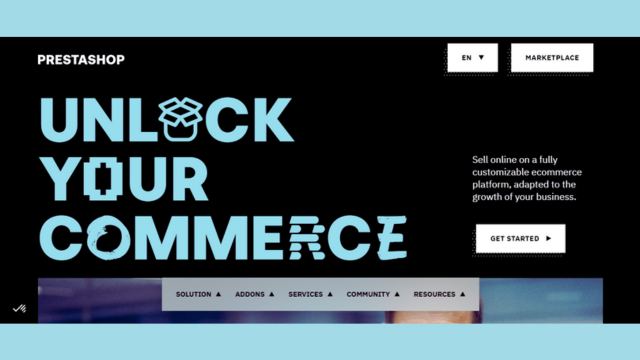
PrestaShop is a powerful e-commerce software that has garnered significant attention for its robust features and user-friendly interface. Designed to cater to businesses of all sizes, PrestaShop provides a comprehensive solution for creating and managing online stores. Its flexibility, scalability, and wide range of functionalities make it a preferred choice for many entrepreneurs and developers worldwide. Here are five pros of using PrestaShop as your e-commerce platform.
Extensive Customization Options
PrestaShop offers extensive customization options for online stores. Users can tailor their websites to meet specific business needs. With a vast library of themes and modules, customization becomes straightforward. This flexibility allows businesses to create unique shopping experiences.
User-Friendly Interface
PrestaShop boasts a user-friendly interface that simplifies store management. Even users without technical expertise can navigate and manage their stores efficiently. The intuitive dashboard offers easy access to essential features and tools. This usability ensures quick setup and smooth operation.
Strong Community Support
Users can find help through forums, documentation, and user groups. This community support fosters collaboration and innovation. It also ensures users can resolve issues quickly and effectively.
Multilingual and Multi-Currency Capabilities
PrestaShop excels in multilingual and multi-currency support. This feature allows businesses to expand globally with ease. Store owners can cater to customers in various regions seamlessly. It ensures a wider reach and higher conversion rates.
SEO-Friendly Features
PrestaShop incorporates SEO-friendly features to enhance online visibility. Built-in tools help optimize product listings and content for search engines. These features drive organic traffic to the store. As a result, businesses can achieve better search engine rankings.
In conclusion, PrestaShop stands out as a versatile and reliable e-commerce solution. Its extensive customization, user-friendly interface, and robust community support make it an excellent choice for online retailers. Additionally, its multilingual capabilities and SEO features further enhance its appeal.
Pros
1. Open-source platform allowing extensive customization and flexibility for users.
2. Offers a wide range of features suitable for various business sizes.
3. Provides multi-language and multi-currency support for global expansion.
4. Active community support with forums, modules, and extensions available.
Cons
1. Requires technical expertise for installation, setup, and maintenance.
2. Limited customer support compared to other e-commerce platforms.
3. Some advanced features may require additional paid modules or extensions.
4. Regular updates and security patches are necessary to prevent vulnerabilities.
OpenCart
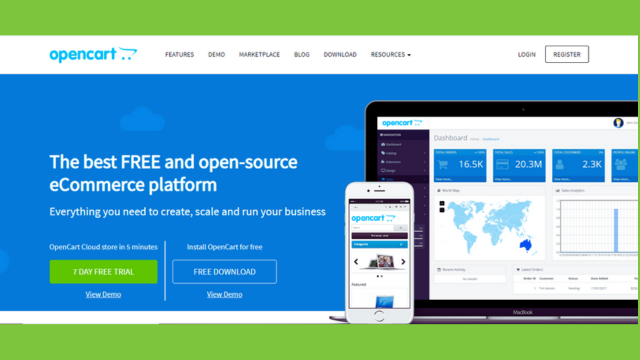
OpenCart stands out as a highly efficient and user-friendly e-commerce software designed to meet the needs of online businesses of all sizes. Its robust features, ease of use, and extensive customization options make it a popular choice for entrepreneurs and developers. Here are some critical advantages of using OpenCart for your e-commerce platform.
User-Friendly Interface
OpenCart offers a clean, intuitive interface that simplifies online store management. Even users with limited technical knowledge can easily navigate the platform, and its straightforward design reduces the learning curve for new users.
Extensive Customization Options
OpenCart provides a wide range of customization options to tailor your store. You can create a unique shopping experience with numerous themes and modules. Its flexibility allows you to adapt your store to your brand’s needs.
Strong Community Support
This community offers many resources, including forums, tutorials, and extensions. You can find support and solutions for almost any issue you encounter.
Cost-Effective Solution
OpenCart is a cost-effective solution for starting an online store. It is open-source, meaning you can use it for free and only pay for hosting. This affordability makes it accessible to small businesses and startups with limited budgets.
Extensive Reporting and Analytics
OpenCart comes with built-in reporting and analytics tools to track your performance. These tools provide insights into sales, customer behavior, and inventory management. Access to detailed data helps you make informed business decisions.
In conclusion, OpenCart’s user-friendly interface, extensive customization options, strong community support, cost-effectiveness, and comprehensive reporting tools make it an excellent choice for e-commerce. Whether launching a new store or upgrading an existing one, OpenCart can provide the functionality and flexibility you need to succeed.
Pros
1. OpenCart offers a wide range of customizable themes and templates.
2. It provides a simple and intuitive user interface for management.
3. The platform supports multiple languages and currencies for global reach.
4. OpenCart has a large community of developers for support.
Cons
1. Limited built-in features compared to some other e-commerce platforms.
2. Customization often requires technical expertise, making it challenging for beginners.
3. The platform may experience performance issues with large-scale stores.
4. OpenCart’s extensions and add-ons can sometimes be costly.
Shift4 Shop:
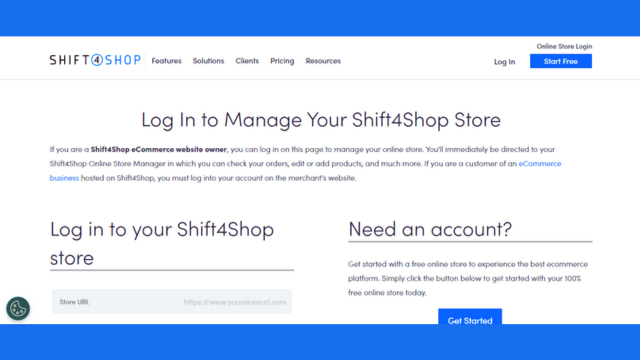
Shift4 Shop stands out as one of the best e-commerce platforms available today. It offers robust features and a user-friendly interface designed to help businesses grow. With its comprehensive tools and customizable options, it caters to both beginners and experienced online merchants. The platform supports seamless integration with various payment processors, marketing tools, and shipping carriers, ensuring a smooth shopping experience for customers. Here are five pros that make Shift4 Shop a top choice for e-commerce software.
Extensive Customization Options
Shift4 Shop provides extensive customization options to meet unique business needs. You can easily adjust your store’s layout, colors, and fonts. This flexibility helps create a brand-specific shopping experience. You can also use advanced HTML and CSS for deeper customization. Shift4 Shop ensures your store looks exactly how you envision it.
Comprehensive Feature Set
The platform boasts a comprehensive feature set suitable for any business size. Shift4Shop includes built-in SEO tools, product management, and customer management systems. The software supports unlimited product listings and multiple payment gateways. You can also use advanced reporting and analytics to track performance performance.
Strong Security Measures
Shift4 Shop prioritizes security with solid measures to protect your store. It offers PCI-certified hosting, ensuring compliance with payment card industry standards. The platform provides secure SSL certificates for encrypted transactions. Shift4Shop also includes fraud detection tools to safeguard customer data. This focus on security helps build trust with your customers.
Seamless Integration Capabilities
Seamless integration capabilities enhance the functionality of your Shift4 Shop store. The platform supports integration with numerous third-party apps and services. You can easily connect with email marketing tools, CRM systems, and social media platforms. These integrations streamline operations and improve customer engagement. Shift4Shop’s ecosystem ensures your store operates efficiently.
Excellent Customer Support
Shift4 Shop offers excellent customer support to help you succeed. Their support team is available 24/7 to resolve any issues promptly. You can access assistance via phone, email, or live chat. The platform also provides a wealth of resources, including tutorials and forums. This support ensures you get the most out of your e-commerce store.
Shift4 Shop’s extensive customization options, comprehensive features, strong security measures, seamless integrations, and excellent customer support make it an outstanding e-commerce solution. Its robust platform is designed to help businesses thrive in the competitive online marketplace.
Pros
1. Shift4 Shop offers extensive customization options for personalized storefronts.
2. The platform provides comprehensive features suitable for businesses of all sizes.
3. Strong security measures, including PCI-certified hosting and SSL certificates.
4. Seamless integration capabilities with third-party apps for enhanced functionality.
Cons
1. There is a steeper learning curve for beginners due to advanced customization options.
2. Some users may find the pricing plans relatively expensive.
3. Limited design templates compared to other e-commerce platforms.
4. Occasional glitches reported by users affecting user experience.
Guide About Best E-commerce Software
Selecting the ideal e-commerce software is essential for any business looking to establish or expand its online presence. Choosing an appropriate platform can significantly affect user experience, with lasting effects impacting everything from user journeys to employee productivity. Given all the options that offer different features and functionalities, choosing an ideal one may seem daunting; when making this crucial selection decision, all solutions must meet your goals, needs, and growth plans accordingly. Below are five essential elements you should keep in mind when making this critical selection decision:
Scalability
Scalability should be your number one consideration when selecting an e-commerce software solution. Your business may start small but eventually expand, so your chosen platform must allow this expansion without negatively affecting performance or functionality.
Key Considerations;
Aim: To Ensure That Traffic Can Handle an Increase: For peak seasons or sales events, ensure your platform can accommodate an increase in traffic by expanding capacity as necessary.
Substantive Features: As your business expands, ensure your software can meet changing demands by supporting new features as your needs shift. Ensure the software can accommodate multiple languages, currencies, and tax systems when planning international expansion plans.
Customization and Adaptability
Every business has specific branding requirements that must be fulfilled in its storefront, checkout process, and other components. E-commerce software should provide high levels of customization and flexibility so your storefront, checkout process, and other elements can meet these individualized specifications.
Key Considerations: Design Flexibility: When researching platforms that support customizable templates or themes for store designs, look out for platforms that allow you to craft an individual aesthetic.
– Custom Features: To ensure your business model runs efficiently, ensure the platform offers customizable features tailored specifically to you – such as personalized product recommendations or unique payment gateways.
Integrate Easily With Other Tools: When considering software options, ensure they integrate smoothly with any systems you currently employ, such as CRM, ERP, or marketing automation tools.
User Experience A superior user experience is vital to turning visitors into customers and keeping them engaged with your e-commerce store. Your chosen software should provide customers and administrators with an enjoyable user journey, intuitive navigation tools, fast load times, and an efficient checkout process for shoppers while offering store management via an intuitive dashboard interface.
Critical Considerations for Mobile Responsiveness:
As more shoppers turn to smartphones and tablets for shopping purposes, ensure your platform offers a responsive design suitable for these devices.
Speed and performance: For customers to have an enjoyable shopping experience, platforms must load quickly and process transactions seamlessly.
– Simple Checkout Process An efficient checkout process can significantly lower cart abandonment rates. Features like guest checkout, multiple payment options, and auto address filling may help mitigate and decrease cart abandonment rates.
E-commerce security should always be a top priority, given that you will handle sensitive customer information like payment details. Any software chosen should meet rigorous security standards to safeguard your business and customers.
PCI Compliance:
To protect card data, businesses that accept, process, store, or transmit credit card data should adhere to PCI-DSS security standards to create a safe environment.
– Securing SSL: SSL encryption can provide essential protection to data transferred between websites and customers, so make sure your platform offers this type of certificate for their protection.
Cost remains an integral component of running any business. Regarding an e-commerce platform, the total cost of ownership should include initial setup expenses and ongoing costs such as hosting fees, transaction fees, plugin license costs, and support expenses.
Pricing Structures:
Selecting a platform with transparent pricing structures allows you to gain a comprehensive overview of all costs involved, including any potential hidden fees.
Subscription Plans: Many platforms provide tiered subscription plans explicitly tailored to your business size and needs; choose one that can meet current demands and any anticipated growth that comes with future expansion plans.
Value for Money:
When selecting any platform, consider its overall cost-benefit relationship. Sometimes, paying more for features and reliability that stand out is worth investing in.
Customer Support
Magento E-commerce Platform Any technology must be equipped with reliable customer support to avoid downtime that erodes sales. Unexpected issues could arise suddenly and require immediate resolution; without help, issues could drag out, leading to more significant downtime and directly affecting sales.
Key Considerations Its Availability: Make sure the platform offers 24/7 customer support as E-commerce businesses typically operate around the clock and may need assistance at any point during operation.
Support Channels: When shopping for support, consider all available channels that meet your needs – live chat, phone support, email communications, and knowledge bases/community forums are excellent ways for helping hands to come whenever and however they best fit into your day.
Response Times: Ascertain typical response times for customer inquiries. Speedy replies can be especially crucial during peak periods or urgent situations.
Quality of Support: Examine user testimonials or reviews regarding the quality of support offered. It must include knowledgeable personnel capable of rapidly and effectively resolving issues.
Marketing Tools and SEO Features
Your online store requires practical marketing tools and optimization capabilities to thrive, attract customers, and increase search engine visibility. Its platform must incorporate these features as standard.
Key Considerations Built-In Marketing Tools: Look for platforms with built-in marketing tools such as email marketing integration, social media integration, and customer loyalty programs to attract and retain more customers more effectively.
SEO Optimization: For optimal SEO performance, ensure your platform offers robust SEO features like customizable meta tags, SEO-friendly URLs, and automatic sitemaps. These will improve search engine rankings and bring organic traffic directly to your store.
Analytics and Reporting:
Effective analytics and reporting solutions are crucial for understanding customer behavior and measuring marketing initiatives’ success.
Promotions and Discounts: With ease of use, creating, managing, and offering promotions can help attract new customers while increasing sales. Make sure that the platform supports multiple promotional strategies.
Choosing an e-commerce software requires carefully considering many aspects to meet current needs and future growth aspirations. Scalability, customization and flexibility, user experience, security, and cost can dramatically affect an online store’s success; by carefully considering each aspect, you can make an informed decision that positions your business for future e-commerce success. A great platform should meet budgetary concerns and technical demands and fulfill goals and aspirations – take time researching, comparing, and testing platforms before making your final selection!
Frequently Asked Questions about Best E-commerce Software
Navigating all available E-commerce solutions
can be challenging, so there is a list of FAQs on E-commerce platforms to simplify your decision process and ensure it fulfills your business needs and goals. When choosing an e-commerce platform, features essential to its success must be prioritized.
Prioritize features directly impacting business operations and customer experiences when selecting an e-commerce platform. Essential features include scalability, customization options, user-friendly design, robust security measures, and integrated marketing tools. Scalability will enable your platform to grow with your business needs; customization allows you to tailor its appearance and functionality; user-friendly designs can increase conversion rates while user satisfaction improves with customizations; robust security measures protect sensitive customer data while integrated marketing tools drive traffic and boost sales.
How important is scaling for an e-commerce software system?
Scalability in e-commerce software is paramount as it determines its capacity to accommodate business expansion. As your business expands, more products, higher traffic volumes, and transactions must be accommodated—including managing increased transactions as well as any performance issues caused by high demand—while maintaining fast and responsive store performance during peak times such as holiday sales or promotional events. Selecting an easily scalable platform early will save costly migrations later.
What customer support should you expect from an e-commerce platform?
Reliable customer support is crucial to running successful e-commerce operations, so when selecting an e-commerce platform, ensure it provides 24/7 support so assistance can be quickly offered whenever an issue arises. When reviewing platforms that feature live chat features or email, phone, and knowledge base support and options such as live chat/phone/knowledge base/live chat, etc., look for those that offer quick response times during peak business hours, as swift resolution times are imperative. User reviews indicate quality customer support provided by different platforms.
What impact will an e-commerce platform’s cost structure have on your decision-making?
Considerations should be given to the cost structure of an e-commerce platform when forming your budget and considering profitability for your business. Be mindful of upfront and ongoing expenses such as subscription fees, transaction fees, hosting costs, and any plugin fees or extra features or plugins associated with adding your store online. Transparent pricing helps avoid unexpected charges; some platforms even provide tiered plans explicitly tailored to your size and needs that could reduce overall costs over time. When making this investment decision, finding an equilibrium between cost and reliability will result in greater returns.
Why Are Marketing Tools and SEO Features Necessary in an E-Commerce Software Solution?
Marketing tools and SEO features are integral to online store success, helping bring in customers and increase traffic and sales. Email marketing, social media integration, customer loyalty programs, and analytics/reporting can be leveraged effectively to attract and keep customers. SEO features like customizable meta tags, SEO-friendly URLs, and sitemaps improve search engine rankings so your store is more accessible for customers to locate. At the same time, analytics/reporting tools provide insights into customer behaviors and campaign performance, allowing marketing strategies to be refined further.
Learning the essential features of e-commerce software with help from these frequently asked questions (FAQs) is invaluable when making decisions for your e-commerce venture. When selecting an e-commerce platform, consider these factors to aid informed choices that meet immediate needs and will lead to future expansion and success!
Final Thoughts
As any successful business knows, selecting an ideal e-commerce software solution is vital for its continued growth. A trustworthy platform should accommodate business expansion while meeting changing business requirements; customizable store designs should seamlessly blend in with customer experiences; security should always come first when protecting sensitive data with costs such as setup fees and maintenance charges being factored into calculations; reliable customer support services ensure issues can be quickly and efficiently addressed;
Marketing and SEO tools help drive customers into your store, while analytics and reporting give an inside view of its performance. Integrating other tools increases operational efficiency and customer engagement, and mobile responsiveness ensures consistent shopping experiences across devices.
Shopify offers an easy e-commerce platform tailored towards quick setup and scaling up.
Magento can better fulfill complex enterprise needs.
WooCommerce: WooCommerce is an open-source e-commerce plugin designed for WordPress that makes setting up an online shop easy for small to mid-sized businesses.
Furthermore:
Built-in marketing tools simplify promotional efforts and campaigns, providing A/B testing features to increase conversion rates while multichannel capabilities reach customers on various platforms. Inventory management tools keep stock levels accurate while payment gateway integration offers secure payment options to your customers; shipping logistics features help streamline order fulfillment while scaling ensures that your e-commerce platform can grow with your business.
User-friendly interfaces help streamline store management and accelerate learning curves. When selecting a platform that aligns with your business goals and vision, customer testimonials provide invaluable feedback, while free trials provide practical experience before committing.
Evaluate potential platforms based on features, reliability, and support; make an informed choice that supports long-term growth and success; investing in top e-commerce software can set your business up for sustainable expansion; choosing an ideal platform could have a profound effect on online presence and profitability – leading to ongoing business expansion.
Next Article: Best Website Builder Software

